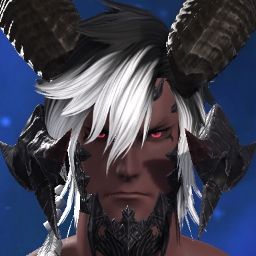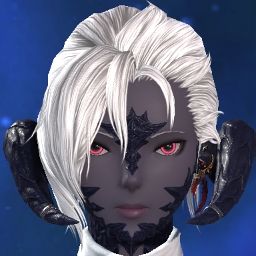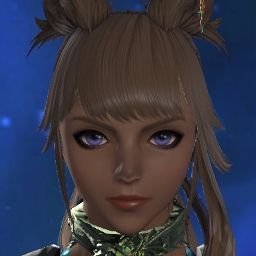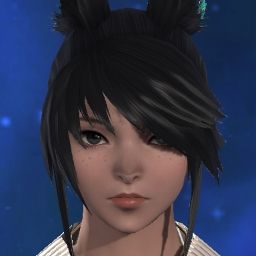-
07-12-2022 08:54 PM #271Player

- Join Date
- May 2014
- Location
- Leaving my SAM in Kugane
- Posts
- 2,948
- Character
- Raansu Omiyari
- World
- Gilgamesh
- Main Class
- Samurai Lv 100
(1)
-
07-12-2022 08:57 PM #272Player

- Join Date
- Jul 2015
- Location
- Amaurot
- Posts
- 4,449
- Character
- Tristain Archambeau
- World
- Cerberus
- Main Class
- Black Mage Lv 90
You're correct that my views are not going to change, especially when you are trying to premise this on something that is not there, i.e. an inherent concern for these sacrifices, as opposed to a concern about the goal that they'd achieve, i.e. restoring their civilisation back to what it was and that, in turn, leading it to the fate of the Plenty. This is putting aside what would happen if her people had even agreed to her requests (reminder based on SHB lore: they were divided over these)? They still could not directly manipulate dynamis, so what was her plan if they agreed? Was she not going to sunder them? Or was she just going to ask them to queue up in an orderly fashion for it?
I am not denying that she cares about an abstraction of "mankind", what I am explicitly not going along with here is that she performed the sundering purely because of a moral disagreement over these sacrifices because of an intrinsic desire to protect them, when absolutely nothing from her faction's own mouths, or the writers', supports this. Once more - the one reference she does make directly to it in the strawman ancient scene is to the outcome of these sacrifices if they went along with them. I am sure she loved the idea of a mankind, one steeled (in her mind) by the acceptance of the "necessity" of suffering. But it makes little difference to how I view what she did to her people.(5)Last edited by Lauront; 07-12-2022 at 09:02 PM.
When the game's story becomes self-aware:

-
07-12-2022 09:14 PM #273
I mean, no, obviously she wasn't going to Sunder them if they decided not to go through with the sacrifices and moved after the tragedy. From what we are told by Hythlodaeus, the explicit motivation of the faction she publicly and loudly headed was to stop the sacrifices and allow the new life on the star to take charge of the star. It doesn't matter whether you read the localization or the directly translated Japanese—the motivation of Venat's faction is explicitly, textually, the fact that they were unwilling to allow the new life that they felt should inherit the star be sacrificed for the sake of restoring the lives of the Ancients that had sacrificed themselves.
If the Ancients had decided to listen to her, not gone ahead with their sacrifices, and gave the world to the new life they'd created, then the Sundering would not have happened. Venat would have had proof that her people could change and could endure sorrow and grow stronger from it, and she would have had no reason at all to doubt that they would be capable of further change to defeat Meteion. In the level 87 cutscene the literal last thing you see Venat doing before the Sundering is her pleading with her people to accept the sorrow and to change rather than cling to a false paradise. That cutscene was obviously metaphorical, but in that specific case the idea it's trying to get across is that Venat did, in fact, wait 'til the literal last moment after trying to convince the Ancients to move on since at least the second sacrifice to Zodiark before she made the choice to Sunder them.
The idea that Venat doesn't care about mankind except in the abstract is ridiculous. She cared about her people and tried to save them from the doom that was coming, while aware that telling the truth was a risk that could potentially doom things even worse than they'd gone in the WoL's timeline. She cared about her people and the new life on the planet, and tried to argue that they should step back and hand the world to this new life rather than sacrifice it, so that the remnants of the Ancients could grow from their sorrow and the new life they'd created had a chance to be alive and to safeguard the star. She cared about the Sundered lives and tried to help them whenever she could, giving of herself time and time again to restore the Source after Calamities and expending so much strength she was barely able to talk to anyone anymore by the time Endwalker came around, and she cared about the lives of the entire universe and set up events so that her champion would be able to defeat Meteion and save all life in the universe from being erased.
Venat is not some monster who cares about people solely in the abstract. Regardless of what your opinion on her actions is, saying that she doesn't care about people beyond the idea of "a mankind" is wrong.(3)
-
07-12-2022 09:36 PM #274Player

- Join Date
- Jul 2015
- Location
- Amaurot
- Posts
- 4,449
- Character
- Tristain Archambeau
- World
- Cerberus
- Main Class
- Black Mage Lv 90
We're just going in circles at this point. As mentioned, the Hythlodaeus shade is Emet's re-creation, after she had resolved not to tell the Convocation or her people outside of her own circle (not even 100% clear what she told them) about the truth of the matter to avoid panic or alienating Hermes. So "explicitly, textually", the only account of this motive as central is from someone intentionally kept in the dark over the matter - any discussion of it in private is referencing the outcome of them not changing their path, and this is also how the devs frame it in the Q&A. What is never addressed is what her people - once more, already divided over this matter - would've done with the full picture, had they been given it. What was her alternate plan to deal with dynamis had they listened? How does this comport with the interpretation Yoshi gives of her potentially acting so as to keep the timelines the same (underscored by her efforts to spare Emet in spite of knowing what he'd go on to do)? None of this is definitively answered, so I am afraid your "obviously" is not one to me and does not follow "explicitly, textually".
And I'm sorry but for her to be able to genocide her own people in that way, reduce and alter them to something even she recognises is not the same as them ("last of my kind", "my children"), so as to fit her view of what man "should" be like - a mankind that she only ever observes rather than lives amongst - does speak to her having a rather abstract notion of mankind; one she is quite willing to see subjected to all manner of suffering because of her surrender to this notion that it's "necessary". You are of course free to read into her motives what you want, but I am not really compelled to run with your narrative spin on this, and won't be - if the writers want to come clear up this mess they created in more definitive terms, then I will re-visit my views on the matter. Should they wish to double down on trying to justify what she did to her people, it'll be a good cue for me to take my leave.(6)Last edited by Lauront; 07-12-2022 at 10:20 PM.
When the game's story becomes self-aware:

-
07-12-2022 10:10 PM #275
The two reasons given for the sundering were she didn't believe the Ancients capable of changing their ways (an issue of hers which predates Zodiark) or of being able to interact with dynamis. Those reasons are mutually exclusive, so there was no situation we're presented with in which she wasn't going to sunder all of mankind. It's why the narrative surrounding her is problematic because her "trying" to get the Ancients to change doesn't mean anything if she still didn't think they could defeat Meteion.
(Quoting Brinne because she said it better than I could.)The idea that Venat doesn't care about mankind except in the abstract is ridiculous.
Venat, fundamentally, is an ideologue. Her sense of love and wonder is sincere and true, but she is a big-picture person in the extreme, who thinks in the abstract. When she says she loves, it’s not of any specific person or thing. It’s love of “humanity’s potential.” It’s love of “a flawed world,” of “mankind’s ability to find a way forward,” - a particular way of seeing the world that she believes only she, at this point, has, that she waxes poetic about in her big speech leading up to her question of her journey. Our Azem is quoted as describing her as "both close and incredibly distant," "akin to a force of nature," and that seems very apt. She also admits that she, like Hermes, is dissatisfied with the world order as it exists now – she wants others to see the world as she does. To welcome struggle and strife and flaws and therefore, in her eyes, truly treasure the “miracle of creation.”
Largely because of her interactions with us, the portrait she receives of someone from “a flawed world full of suffering,” Venat further romanticizes the idea of beauty and strength in the face of struggle and suffering. She sees that version of the world as more exciting, more appealing than the one she lives in now, which she sees as misguided and indolent – she already had, hence her being extremely receptive to hearing Meteion’s two-sentence description of the Plenty, and deciding the Ancients were on the same path based on that.(9)
-
07-12-2022 10:14 PM #276Player

- Join Date
- Sep 2021
- Posts
- 2,305
- Character
- Fenris Pendragon
- World
- Spriggan
- Main Class
- White Mage Lv 80
I remain impressed with the lengths that people are willing to go to in defence of the 2nd most destructive character in the game apart from Meteion. Venat, who couldn't be more clearly coded as a fallen angel, all while maligning those who understand and see the perspective of the Ancients and more specifically the faction supporting Zodiark.
I have no reason to believe that the woman who did this is on the side of good.
 (8)Авейонд-сны
(8)Авейонд-сны

-
07-12-2022 10:17 PM #277
emet defenders are a different kind of breed alright xD
(6)
-
07-12-2022 10:30 PM #278
Moral relativism. A long and forgotten term, evidently.
(1)
-
07-12-2022 10:47 PM #279
There's a weird misconception that disliking Venat's actions means automatically supporting Emet's.
There was a "none of them were right" option in the Omega quest for a reason. In the end, it was just a big chain of questionable choices that started with Hermes creating Meteion.
But...we already have a topic for this subject so I'd rather not see this one derailed into a repeat of the other one.(8)
-
07-12-2022 10:57 PM #280
I get the feeling these "translation errors" are less about language and more about people frustrated that characters they think should be villainized aren't, and characters that are villainized, shouldn't be. I don't think any amount of different localization would change that, people are naturally going to have different opinions on characters. I personally didn't enjoy the character of meteion, that doesn't make her poorly translated, it just means I didn't like her.
(9)



 Reply With Quote
Reply With Quote













